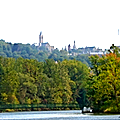- By the office of Rep. Tom Reed
- Business & Technology
 Print
Print  Tom Reed was at Cornell University Tuesday to meet with professors for a tour of the Cornell High Energy Synchrotron Light Source (CHESS) lab and the Cornell Electron Storage Ring, both supported by the National Science Foundation (NSF) funding Reed secured for the lab. Most recently, Reed worked to secure $100 million to fund the CHESS Lab on a long-term basis.
Tom Reed was at Cornell University Tuesday to meet with professors for a tour of the Cornell High Energy Synchrotron Light Source (CHESS) lab and the Cornell Electron Storage Ring, both supported by the National Science Foundation (NSF) funding Reed secured for the lab. Most recently, Reed worked to secure $100 million to fund the CHESS Lab on a long-term basis.“When we have conversations about where our national priorities lie, we have to fairly consider which initiatives will provide for economic opportunity and have a large return on taxpayers’ investment,” Reed said. “By securing federal funding for Cornell’s CHESS Lab, we’re caring for jobs in our region and we’re also caring for the hundreds of thousands of lives impacted by the sophisticated research being done. Whether it’s developing new materials, discovering new drugs, improving electric vehicles, or studying viruses, the CHESS Lab is constantly breaking new ground and opening doors for local small businesses and start-ups. Since coming to Congress I have always acknowledged and supported the critical role NSF dollars play in our area to support jobs, whether at Cornell or the University of Rochester, the National Science Foundation is critical to our area.”
During the site visit Reed met Alex Deyhim, Lansing resident and owner of Advanced Design Consulting (ADC), an engineering and consulting firm. Deyhim’s small business worked with Cornell researchers at the CHESS Lab to develop and manufacture a state-of-the-art adjustable x-ray slit system. Working closely with Cornell’s CHESS Lab, Deyhim relies on the NSF funding to continue the viability of the lab’s life at Cornell to support his ongoing research developments.
“The funding from NSF that Cornell receives to do this amazing research has a direct impact on a company like ADC,” Alex Deyhim said. “We are able to license these technologies and commercialize them, ultimately creating engineering and manufacturing job opportunities right here in upstate New York.”
“Hearing from these innovators and job creators and seeing the cutting edge technology being developed right here in our backyard, it’s clear this valuable resource saves lives and supports job growth,” Reed continued. “Securing the facility’s future also means we’re helping to secure the region’s future and the high-tech jobs of today and tomorrow.”
Cornell’s CHESS Lab, funded by the National Science Foundation since 1978, supports research in physics, materials science, chemistry, biology and engineering, among other fields. The CHESS Lab is one of only five such facilities in the world and one of only two in the United States.
v10i15




